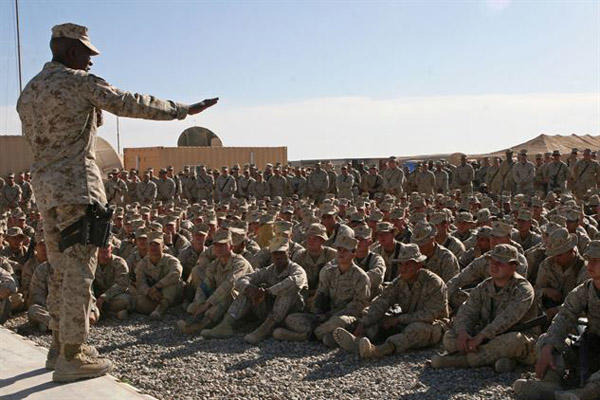If you're around the greater District of Columbia area the day after Veterans Day, consider attending a reading by veterans at The Writer's Center.
"Veterans Return Home: Readings" starts at 3 p.m. on Nov. 12 and will feature several authors reading from a collection of nonfiction accounts of service members returning to civilian life.
It is a joint event with "Retire the Colors: Veterans and Civilians on Iraq and Afghanistan" and the Veterans Writing Project, and will feature readers from both.
For more information on the event and presenters, visit The Writer's Center website.
I had the opportunity to speak with Dario DiBattista, the nonfiction editor of O-Dark-Thirty, a quarterly literary journal published by the Veterans Writing Project, about the event and what it means to him in the context of Veterans Day.
DiBattista is the editor of the anthology "Retire the Colors: Veterans & Civilians on Iraq & Afghanistan." His work has appeared in the Washingtonian, The New York Times, The Washington Post, Connecticut Review and many other publications.
He's also been profiled in The New York Times and has been a commentator on NPR and for the BBC. He served in the United States Marine Corps Reserve from 2001 to 2007, later becoming a distinguished graduate of the Johns Hopkins University M.A. in Writing Program.
Q: This reading comes the day after Veterans Day, so please tell us what it means to you to be a veteran and why it's important for veterans to share at an event such as "Veterans Return Home: Readings."
A: "I think your average American knows almost nothing about military service. There are some obvious reasons for that -- less than 1% of all the citizenry makes up the armed services at any given time, and less than 1% of Americans have served in Iraq and Afghanistan. You weigh this into the fact that military communities are often segregated from large civilian communities, and it equals a lot less chances for civilians to be connected.
"At the same time, we compartmentalize their service into simple expressions like holding your hand over your heart at a ballgame or saying, "Thank you for your service," which requires no intellectual engagement with the stories of veterans.
"But here's the thing: War is a democratic process. The military does not choose to go to war. The people we elect -- or don't elect -- make those decisions. Everyone has some stake in the lives of our service members. So I think they should take a little bit of time to understand our stories, if they do indeed really want to support us."
Q: Can you tell us about your military time, and how that has helped or hindered you in the civilian world?
A: "I have a theory that simply having served in the military overqualifies you to be a writer. Beyond the qualities of discipline and determination that the military ingrains into its servicemen and women, which are essential tools of seeking a career in arts, there are other unique experiences that make this true.
"First, I think most people would agree that good writing is concise and clear -- right, just making up an example, like, you don't endlessly describe a tree outside of a scene at a bar for no reason. You put a reader in the bar and let them know what's going on as quickly and smoothly as possible. The tree probably doesn't matter. In the military, you're trained to go into an environment -- or "setting," as writers would say -- and figure out what's going on really quickly. This innate understanding helps when trying to create scenes.
"Second, the military forces you to understand people in a way no other job that I know of does. And stories are about people -- period. Who walks point? Who do you give the machine gun? What is your subordinate dealing with back home, and how is that affecting their performance? You have to understand people to be a military leader, and there are so many different people from so many different cultures that you meet.
"Third, and I don't say this lightly, stories are about conflicts, external and internal. And what conflict is bigger than life and death and war? Having gone through these humbling experiences makes someone truly understand stakes and drama."
Q: Why should civilians come to this and similar readings? What do they get out of it?
A: "Like with all good writing, you get a new empathy, a new understanding, a new way of thinking. You'll be exposed to a group of people who have stories you really wouldn't expect. They will shock and enlighten you in a good way."
Q: Do any stories come to mind that really make you appreciate your fellow service members and veterans?
A: "I try not to elevate anyone's experience over anyone else's, but veterans, in general, are really unique people. Whether it was for their country, for school money or for themselves, they took up an oath to swear and defend the Constitution to do something positive. They're dreamers, in this sense. I think day-to-day experiences cause reflection. Experiences like war cause revelation. We can all learn a lot from anyone who's put their life on the line for our country."
Q: You have been involved with veterans and encouraging them to write for several years now. What is it about writing that you would say helps veterans through the transition to the civilian lifestyle?
A: "When someone goes through something traumatic and challenging -- and I'm oversimplifying the science here -- that can be imprinted onto the "lizard brain" we all have as an evolutionary mechanism, through the fight-or-flight experience. When someone uses writing -- or dance, or art, or music, etc. -- they're applying higher brain functioning to those powerful memories. In essence, this can help someone with a painful memory shape, reflect upon and ultimately control it, instead of the other way around."
For more information and to hear these stories, consider attending the event. You can also buy the book, "Retire the Colors: Veterans & Civilians on Iraq & Afghanistan."
Want to Know More About the Military?
Be sure to get the latest news about the U.S. military, as well as critical info about how to join and all the benefits of service. Subscribe to Military.com and receive customized updates delivered straight to your inbox.











